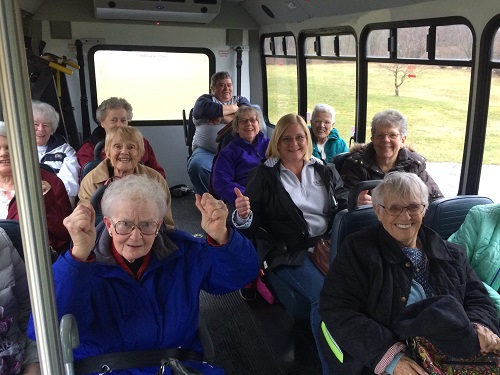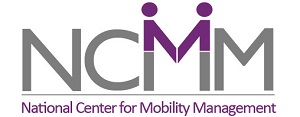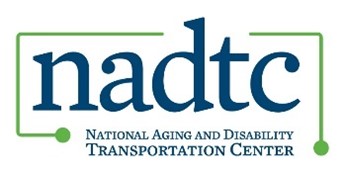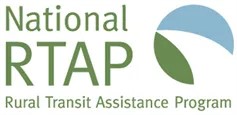CCAM-Related Interagency Initiatives

The Coordinating Council on Access and Mobility (CCAM) has led interagency efforts to improve the availability, accessibility, and efficiency of transportation. The CCAM strives to test new and innovative methods of coordinating human services transportation.
The CCAM accomplishes this goal through pilot program grants and national technical assistance center community grants. The approach has enabled the CCAM to support projects that meet a range of human services transportation needs of individuals with disabilities, older adults, and individuals of low income while also testing new technologies and services. Over the past several decades, these efforts have consisted of the following programs.
Please note: The cooperative agreements of the National Aging and Disability Transportation Center (NADTC) and National Center for Mobility Management (NCMM) ended on September 30, 2025, and June 30, 2025, respectively, and have transitioned to the CCAM-TAC.
CCAM-Related Pilot Programs (2004–Current)
Innovative Coordinated Access and Mobility (2016–Current)
The Innovative Coordinated Access and Mobility (ICAM) pilot program provides funding for capital projects to improve the coordination of non-emergency medical transportation (NEMT) for transportation-disadvantaged populations. By funding projects that strengthen transportation-human services ties, FTA deploys these grants to demonstrate its continued commitment to broader transportation coordination.
FTA funded the National Aging and Disability Transportation Center (NADTC), which provided technical assistance to organizations awarded an ICAM grant after 2017, to help build capacity and create opportunities for learning and knowledge exchange among ICAM grantees. NADTC collected and shares best practices of potentially replicable projects with the public by sharing final grantee reports.
- Innovative Coordinated Access and Mobility Grants (2023–2024)
- Annual Report Fiscal Year 2024 (Report 0272)
- Annual Report Fiscal Year 2024 (Report 0272)
- Innovative Coordinated Access and Mobility Grants (2021–2022)
- Annual Report Fiscal Year 2023 (Report 0260)
- Annual Report Fiscal Year 2022 (Report 0238)
- Mobility for All Pilot Program Grants (2020)
- Annual Report Fiscal Year 2021 (Report 0208)
- Annual Report Fiscal Year 2020 (Report 0177)
- Innovative Coordinated Access and Mobility/Human Services Coordinated Research Grants (2018–2019)
- Annual Report Fiscal Year 2019 (Report 0147)
- Annual Report Fiscal Year 2018 (Report 0126)
- Rides to Wellness Demonstration and Innovative Coordinated Access and Mobility Grants (2016)
- Annual Report Fiscal Year 2017 (Report 0100)
- Rides to Wellness Demonstration Grants Program Evaluation (Report 0190)
Veterans Transportation Community Living Initiative (2011–2012)
The Veterans Transportation Community Living Initiative (VTCLI) awarded funding to help veterans, military families, and others connect to jobs and services in their communities by improving access to local transportation options. Developed and supported by the CCAM, projects were funded to strengthen and promote “one-call” information centers and other tools to bring convenience to information, transportation options, and other support services. Learn more about these projects.
United We Ride (2004-2008)
The United We Ride (UWR) initiative focused on improving the availability, quality, and efficiency of transportation services for people with disabilities, older adults, and individuals of low income. UWR partnered with states and communities to facilitate coordination between transportation and human services programs, identifying transportation needs, and creating efficiencies in services while building local partnerships.
For additional information, please refer to the United We Ride Notice of Funding Opportunity (2008).
FTA-Supported National Technical Assistance Center Community Grants (2015–2024)
National Center for Mobility Management (NCMM) Community Grants

Ready-to-Launch Pilot Grants (2024)
The 2024 Ready-to-Launch Pilot Grants allow communities to pilot a promising mobility solution that was inspired and informed by community research. The solution will address transportation equity for low-income, older adult, and/or underserved individuals.
Grantee Highlight: The team in Stephens County is providing rides to people in recovery from Substance Use Disorder (SUD) who need to travel to treatment, probation meetings, and required drug screenings. Peer Recovery Coaches, people who have experienced and recovered from SUD and now counsel others going through the same process, drive people in recovery to necessary appointments and meetings. The program has been received with great enthusiasm and ridership has grown beyond initial estimations. Lauren Jeffrey from Hope For A Drug Free Stephens says: "this transportation solution is not only assisting clients with rides, it is also creating a safe and inclusive community for people in recovery to exist in."
Community Mobility Design Challenge (2019 - 2023)
The Community Mobility Design Challenge supported multi-sector teams in creating innovative, community-informed mobility solutions that address transportation needs. It has helped community teams design and test approaches that expand access to essential services and improve overall community well-being. The challenge focuses on reducing transportation barriers affecting populations facing barriers due to income status, minority status, location, a pre-existing condition, or other reasons.
- Community Mobility Design Challenge 2023 grants
- Community Mobility Design Challenge 2022 grants
- Community Mobility Design Challenge 2021 grants
- Community Mobility Design Challenge 2020 grants
- Community Mobility Design Challenge 2019 grants
Ready-to-Launch Pilot Grants (2021)
Community Mobility Pilots provided competitive grants for communities that have created innovative mobility solutions using a human-centered design process. These grants helped agencies refine and grow their concepts into sustainable services their communities can rely on.
Grantee Highlight: Pilot communities included Allen County, Kansas; Clark County, Washington; Lewis County, Washington; Mercer County, New Jersey; and Quaboag Valley, Massachusetts.
Learning Launch Grants (2021)
Communities that have successfully completed the Community Mobility Design Challenge were invited to move into a Learning Launch of their designed solutions. To learn more about their solutions visit Community Mobility Design Challenge 2020 grants.
Healthcare Access Ready-to-Launch Grants (2019)
These grants, of up to $75,000, supported pilot projects to improve residents’ access to healthcare services through expanded transportation options. Each community created a detailed “operations manual” for the implementation of these pilots and continued to test the financial feasibility, operational viability, and customer desirability of the solutions through proof-of-concept launches.
Grantee Highlight: In Reno, Nevada, one Healthcare Access Ready-to-Launch grantee designed a holistic, wrap-around service for low-income older adults living in senior villages to improve health and well-being, including Lyft rides to healthcare destinations.
Healthcare Access Design Challenge (2017)
Following a more than eight-month process, the seven Design Challenge teams pitched their healthcare access mobility solutions in October of 2018, in Washington, DC. These pitch sessions allowed the teams to celebrate and share their work and solutions that were responsive to customers’ needs, could be financially viable, and had the partnerships and ability to be operationally feasible.
Grantee Highlight: In Colorado Springs, Colorado, one Healthcare Access Design Challenge grantee, Envida, set out to ensure Medicaid patients had transportation to behavioral health and substance abuse treatment, particularly on short notice. Using new technology, Envida designed a system that creates an online healthcare transportation portal, a mobility healthcare manager, specially trained drivers, and low branded vehicles to effectively schedule trips to behavioral health and substance abuse treatments.
Rides to Wellness Design Challenge (2015)
The Design Challenge 2015 grants were part of FTA’s Rides to Wellness initiative. Following a more than six-month process, the 16 Design Challenge teams pitched their healthcare access mobility solutions. The pitch sessions allowed the teams to celebrate their work and share their solutions that were responsive to customers’ needs, could be financially viable, and had the partnerships and ability to be operationally feasible.
Grantee Highlight: In Flint, Michigan, the Mass Transportation Authority of Flint, one Rides to Wellness Design Challenge grantee, saw that behavioral health consumers may experience severe anxiety regarding their transportation needs. With 90 percent of Medicaid-funded behavioral health consumers in Flint not having access to a car, a transportation solution was needed. The Flint MTA designed a person-centered trip planning and travel training system, dedicated staff to coordinate medical travel, new applications to improve customer experiences, and door-through-door service for customers requiring special care.
National Aging and Disability Transportation Center (NADTC) Community Grants

Rural Community Innovations: Transportation Planning Grants (2024)
Rural Community Innovations: Transportation Planning Grants awarded $412,448 for twelve projects, including one Tribe and ten states—Georgia, Kansas, Maine (2), Massachusetts, Michigan, Missouri, New York (2), Montana, Texas and Washington State— to develop a transportation plan that addresses accessibility. Planning activities will identify transportation barriers, consider current and future community needs, actively engage older adults and people with disabilities in the process, and create or strengthen multi-sector collaborative partnerships. Successful applicants will receive technical assistance from NADTC as they implement their planning projects. Ultimately, selected grantees are expected to develop a written plan of action to guide implementation of strategies supported by the community to increase the availability of accessible and equitable transportation services. Each grantee was awarded up to $35,000.
Grantee Highlight: In El Paso, TX, Project Amistad currently serves as the lead agency for the Far West Texas El Paso Regional Transportation Coordination Committee, a collaboration of several agencies including the Rio Grande Area Agency on Aging and Big Bend Community Action Committee, Inc. Amistad’s Rural Transportation Planning Committee’s focus (ARTPC) will be improving the availability, quality, and efficiency of transportation services for older adults and persons with disabilities. ARTPC will provide a person-centered approach, focusing on Brewster, Culberson, Hudspeth, Jeff Davis and Presidio County. The outcome of these planning activities is to provide transit in the rural areas to older adults and people with disabilities.
Equity and Accessibility Implementation Grants (2022)
Equity and Accessibility Implementation grants awarded $490,000 in implementation grants to communities in seven states—Colorado, Connecticut, Iowa, New Mexico, New York, Oregon, and Rhode Island—to implement innovative projects for equitable and accessible transportation to meet the needs of vulnerable and underserved populations, especially older adults and people with disabilities from diverse communities. Each grantee received up to $70,000 to implement a project addressing a need identified in the planning phase. These grants were completed in July 2023. Grantees provided presentations describing the outcomes and impact of their projects.
Grantee Highlight: In Providence, Rhode Island, Rhode Island College Foundation-Age Friendly RI, an Equity and Accessibility Implementation grantee, partnered with Looking Upwards, a nonprofit service organization, to pilot a vehicle sharing program which expanded transportation services to the residents living in Newport’s North End, a historically underserved area. At the conclusion of the pilot, they planned to expand the program to other underserved communities.
Equity and Accessibility: Transportation Planning Grants (2021)
Equity and Accessibility: Transportation Planning Grants provided funding to support the development of program innovations and new models for equitable and accessible transportation to meet the needs of vulnerable and underserved populations, especially older adults and people with disabilities from diverse communities. NADTC awarded $173,495 in competitive grants to nine communities in eight states—Colorado, Connecticut, Iowa, New Mexico, New York, Ohio, Oregon, and Rhode Island.
The nine grantees each received grants of up to $20,000 to engage in inclusive planning with community representatives from historically marginalized populations and local aging, disability, and transportation organizations, and developed a written plan of action that addresses transportation equity and accessibility.
Grantee Highlight: In Portland, Oregon, Ride Connection, Inc., focused on developing a Technology Innovations Strategy through an inclusive planning process to learn from older adults, people with disabilities, and BIPOC (Black and Indigenous People of Color) communities about their priorities and how people may be burdened by or excluded through innovation.
Innovations in Accessible Mobility Grants (2017, 2019, 2020)
Innovations in Accessible Mobility 2020 Grants
Innovations in Accessible Mobility 2020 grants awarded $284,898 in competitive grants to communities in 10 states—Alabama, California, Idaho, Kansas, Minnesota, New Mexico, New Hampshire, South Carolina, Virginia, and Washington State—to implement innovative projects that will remove barriers to transportation and expand mobility options for older adults and people with disabilities. The 10 grantees each received grants of up to $30,000 to fully launch transportation programs that address the needs of older adults and people with disabilities living in their communities.
Grantee Highlight: In Napa, California, Molly’s Angels, one Innovations in Accessible Mobility 2020 grantee, provided free transportation to and from medical appointments for low-income older adults in rural areas of Napa County where public transportation is either not available or has limited availability, and the targeted population experienced difficulties accessing transportation because of frailty, dementia, and physical or mental disabilities.
Innovations in Accessible Mobility 2019 Grants
Innovations in Accessible Mobility 2019 grants awarded $400,000 in competitive grants to communities in five states—Colorado, Maine, New Mexico, New York, and Oklahoma—to implement innovative projects that removed barriers to transportation and expand mobility options for older adults and people with disabilities. The five Innovations in Mobility grantees were selected from among the ten transportation planning grants funded by NADTC in 2018. Each grantee received up to $70,000 to build upon their earlier work, partner with older adults, people with disabilities, and community stakeholders and develop sustainable and replicable innovations that result in increased availability of accessible transportation in their communities.
Grantee Highlight: In Tulsa, Oklahoma, INCOG Area Agency on Aging developed a paratransit travel training program to familiarize and better connect older adults and people with disabilities living in food deserts to grocery stores through the use of existing transportation services. The project also used ridesharing services to implement a program to fill existing transportation gaps to healthy food options.
Innovations in Accessible Mobility 2017 Grants
Innovations in Accessible Mobility 2017 grants supported program innovations and approaches that increase accessible transportation options for older adults and people with disabilities living in the community and maximize use of Enhanced Mobility of Seniors and Individuals with Disabilities Program and other federal funding investments. NADTC announced the award of $300,000 in competitive grants to six communities in five states—Massachusetts, Michigan, Mississippi, Ohio, and Virginia—to develop and test practical and sustainable innovations for increasing accessible transportation. 130 organizations representing 37 states and two tribal nations competed for these FTA cooperative agreement funds, which were managed by the NADTC. Grantees received up to $50,000 each to expand mobility opportunities that enable older adults and people with disabilities to better connect to employment, health care, and other needed community services.
Grantee Highlight: In, Cincinnati, Ohio, Peace Village/Cancer Justice Institute created a mobility navigator/cancer care navigator “hub” to schedule and coordinate rides for cancer treatment and screening.
Getting Ready to Innovate Grants (2018)
The 2018 Getting Ready to Innovate program awarded $200,000 in competitive grants to 10 communities in 10 states—Colorado, Maine, Maryland, New Mexico, Nevada, New York, North Carolina, Oklahoma, Pennsylvania, and Texas—to test and refine innovative ideas for increasing accessible transportation and to develop community support and commitment to move toward full implementation. 48 organizations representing 28 states competed for these FTA cooperative agreement funds, which are managed by NADTC. Grantees received up to $20,000 each to lay the groundwork for innovative approaches that offer greater access to transportation options for older adults and people with disabilities.
Grantee Highlight: In Buffalo, New York, Shared Mobility, Inc investigated ways specific shared ride services (bikeshare, car sharing, and volunteer vanpooling) could innovate to better serve older adults and individuals with disabilities.
National Rural Transit Assistance Program (RTAP) Community Grants

Community Rides Grant Program (2021)
The Community Rides Grant Program offered recipients and sub-recipients of FTA's Formula Grants for Rural Areas and Tribal Transit Programs the opportunity to apply for grant awards of up to $100,000 for projects that develop or strengthen transportation partnerships that improve social determinants of health in rural and tribal communities. Projects focused on increasing access to critical needs such as employment, healthcare, education, healthy food, or social services, as well as build the capacity of transit programs.
Grantee Highlight: In Eastern Sierra, California, the Eastern Sierra Transit Authority expanded demand response service area and hours in a very rural area with tribal members in the community. Collaborators include a hospital, substance abuse recovery center, community action organization, domestic violence center, and others.
